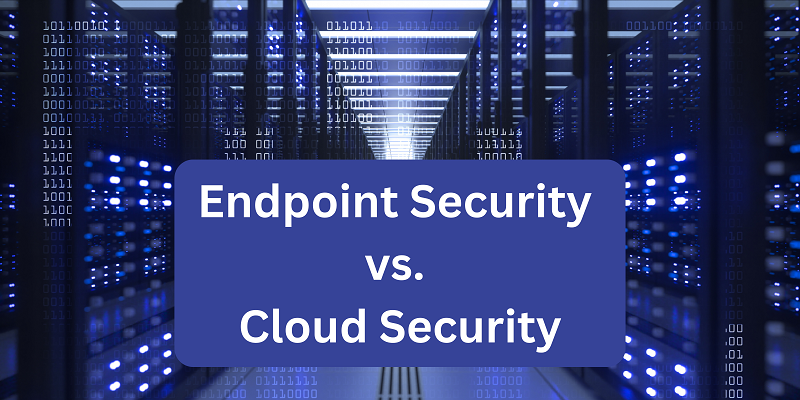Endpoint Security Vs Cloud Security: Understanding the Key Differences and Importance


In today’s digital landscape, organizations face numerous challenges in securing their data and systems against ever-evolving cyber threats. Two critical aspects of this security landscape are endpoint security and cloud security. While both are essential, they have distinct focuses and play different roles in an organization’s overall security strategy. In this article, we will explore the differences between endpoint security and cloud security, their architectural variances, integration possibilities, and the benefits they bring to organizations.
Contents
What is Endpoint Security?
Endpoint security refers to the protection of individual devices or endpoints, such as laptops, desktops, smartphones, and tablets, against cyber threats. It involves implementing a range of security measures to detect, prevent, and respond to attacks targeting these endpoints. Endpoint security solutions typically include antivirus software, firewalls, intrusion detection systems, and endpoint detection and response (EDR) tools.
What is Cloud Security?
Cloud security, on the other hand, focuses on protecting data and applications stored in cloud environments. Cloud security involves safeguarding cloud-based infrastructure, platforms, and services from unauthorized access, data breaches, and other security risks. It encompasses a range of security controls and measures, including access management, encryption, data loss prevention, and threat intelligence.
Architectural difference between Endpoint Security and Cloud Security
Endpoint security operates at the device level, providing security measures specifically designed to protect individual endpoints. It involves installing security software and tools directly on devices to monitor and protect against threats. Endpoint security solutions work on a per-device basis, scanning files and network traffic on the endpoint itself.
Cloud security, on the other hand, operates at a higher level, focusing on securing cloud-based infrastructure and services. It involves securing data centers, networks, and cloud platforms by implementing robust security measures and controls across the entire cloud environment. Cloud security solutions typically leverage centralized security management and monitoring, allowing organizations to apply security policies consistently across multiple cloud resources. To know more
Architectural Differences between Endpoint Security and Cloud Security
Integration of Endpoint Security and Cloud Security
Endpoint security and cloud security are not mutually exclusive. In fact, they often complement each other to create a robust security posture. Integration between endpoint security and cloud security allows for a unified and coordinated defense against cyber threats.
Endpoint security solutions can integrate with cloud-based security services to enhance threat intelligence, enabling the identification of new and emerging threats. By leveraging cloud-based threat intelligence, endpoint security solutions can receive real-time updates on the latest threats and improve their ability to detect and respond to attacks.
Cloud security, on the other hand, can provide additional layers of protection to endpoint devices. For example, cloud-based web filtering and URL reputation services can help prevent users from accessing malicious websites or downloading malicious files. Cloud-based encryption services can also enhance data protection for data stored on endpoints, ensuring that sensitive information remains secure even if the device is compromised.
Benefits of Endpoint Security
Endpoint security plays a crucial role in protecting individual devices and preventing the spread of malware or unauthorized access. Some key benefits of endpoint security include:
Threat Detection and Prevention
Endpoint security solutions employ advanced detection techniques to identify and prevent known and unknown threats. They can detect malware, suspicious activities, and potential vulnerabilities on individual devices.
Incident Response and Remediation
Endpoint security tools enable organizations to respond quickly to security incidents and mitigate their impact. They provide real-time alerts and actionable intelligence, allowing security teams to investigate and respond to threats promptly.
Data Protection
Endpoint security solutions offer features such as data encryption, data loss prevention, and device control, ensuring that sensitive data remains protected, even if the device is lost or stolen.
Compliance
Endpoint security helps organizations meet regulatory and compliance requirements by enforcing security policies and controls on individual devices.
Benefits of Cloud Security
Cloud security is vital in ensuring the confidentiality, integrity, and availability of data and applications hosted in cloud environments. Some key benefits of cloud security include:
Scalability and Flexibility:
Cloud security solutions can scale seamlessly to meet the growing demands of cloud-based infrastructure and services. Organizations can adapt their security measures based on their evolving needs.
Centralized Management
Cloud security provides centralized management and control over security policies and configurations across multiple cloud resources. This simplifies security management and ensures consistent application of security measures.
Enhanced Security Controls
Cloud service providers invest heavily in security measures, offering robust access controls, encryption, and threat intelligence services. This allows organizations to leverage industry-leading security technologies without incurring the high costs associated with developing and maintaining their own security infrastructure.
Disaster Recovery and Business Continuity
Cloud security includes features such as backup and disaster recovery, allowing organizations to quickly restore their data and services in the event of a disaster or system failure.
Conclusion
Endpoint security and cloud security are both crucial components of a comprehensive cybersecurity strategy. While endpoint security focuses on protecting individual devices, cloud security provides overarching protection for cloud-based infrastructure and services. Integrating endpoint security with cloud security enhances an organization’s ability to detect, prevent, and respond to cyber threats effectively.
By implementing robust endpoint security measures, organizations can protect individual devices from malware, unauthorized access, and data breaches. Cloud security, on the other hand, offers scalable and flexible security controls, centralized management, and enhanced protection for data and applications hosted in cloud environments.
To achieve optimal security, organizations should adopt a holistic approach that leverages both endpoint security and cloud security solutions. By combining these two domains, organizations can create a strong security posture that protects their endpoints, secures their cloud-based resources, and mitigates risks effectively in today’s ever-evolving threat landscape.
As an essential component of the industry, an enterprise endpoint security solution plays a vital role in fortifying businesses against emerging threats, ensuring uninterrupted operations, and safeguarding valuable assets. Trust Seqrite, the leading service provider, to empower your organization with the utmost protection and resilience.









